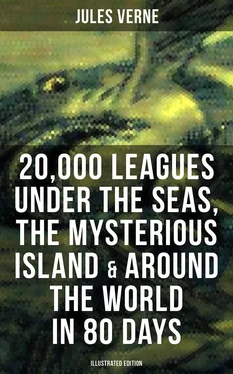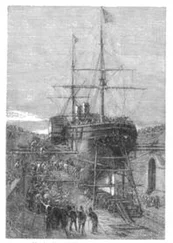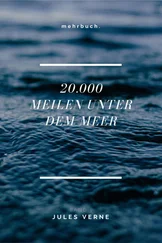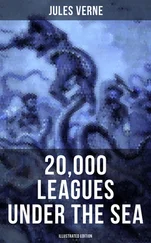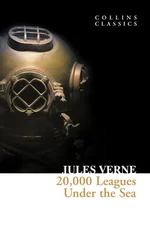“What your d’Urville did on the surface of the sea,” Captain Nemo told me, “I’ve done in the ocean’s interior, but more easily, more completely than he. Constantly tossed about by hurricanes, the Zealous and the new Astrolabe couldn’t compare with the Nautilus, a quiet work room truly at rest in the midst of the waters!”
“Even so, captain,” I said, “there is one major similarity between Dumont d’Urville’s sloops of war and the Nautilus.”
“What’s that, sir?”
“Like them, the Nautilus has run aground!”
“The Nautilus is not aground, sir,” Captain Nemo replied icily. “The Nautilus was built to rest on the ocean floor, and I don’t need to undertake the arduous labors, the maneuvers d’Urville had to attempt in order to float off his sloops of war. The Zealous and the new Astrolabe wellnigh perished, but my Nautilus is in no danger. Tomorrow, on the day stated and at the hour stated, the tide will peacefully lift it off, and it will resume its navigating through the seas.”
“Captain,” I said, “I don’t doubt—”
“Tomorrow,” Captain Nemo added, standing up, “tomorrow at 2:40 in the afternoon, the Nautilus will float off and exit the Torres Strait undamaged.”
Pronouncing these words in an extremely sharp tone, Captain Nemo gave me a curt bow. This was my dismissal, and I reentered my stateroom.
There I found Conseil, who wanted to know the upshot of my interview with the captain.
“My boy,” I replied, “when I expressed the belief that these Papuan natives were a threat to his Nautilus, the captain answered me with great irony. So I’ve just one thing to say to you: have faith in him and sleep in peace.”
“Master has no need for my services?”
“No, my friend. What’s Ned Land up to?”
“Begging master’s indulgence,” Conseil replied, “but our friend Ned is concocting a kangaroo pie that will be the eighth wonder!”
I was left to myself; I went to bed but slept pretty poorly. I kept hearing noises from the savages, who were stamping on the platform and letting out deafening yells. The night passed in this way, without the crew ever emerging from their usual inertia. They were no more disturbed by the presence of these man-eaters than soldiers in an armored fortress are troubled by ants running over the armor plate.
I got up at six o’clock in the morning. The hatches weren’t open. So the air inside hadn’t been renewed; but the air tanks were kept full for any eventuality and would function appropriately to shoot a few cubic meters of oxygen into the Nautilus’s thin atmosphere.
I worked in my stateroom until noon without seeing Captain Nemo even for an instant. Nobody on board seemed to be making any preparations for departure.
I still waited for a while, then I made my way to the main lounge. Its timepiece marked 2:30. In ten minutes the tide would reach its maximum elevation, and if Captain Nemo hadn’t made a rash promise, the Nautilus would immediately break free. If not, many months might pass before it could leave its coral bed.
But some preliminary vibrations could soon be felt over the boat’s hull. I heard its plating grind against the limestone roughness of that coral base.
At 2:35 Captain Nemo appeared in the lounge.
“We’re about to depart,” he said.
“Ah!” I put in.
“I’ve given orders to open the hatches.”
“What about the Papuans?”
“What about them?” Captain Nemo replied, with a light shrug of his shoulders.
“Won’t they come inside the Nautilus?”
“How will they manage that?”
“By jumping down the hatches you’re about to open.”
“Professor Aronnax,” Captain Nemo replied serenely, “the Nautilus’s hatches aren’t to be entered in that fashion even when they’re open.”
I gaped at the captain.
“You don’t understand?” he said to me.
“Not in the least.”
“Well, come along and you’ll see!”
I headed to the central companionway. There, very puzzled, Ned Land and Conseil watched the crewmen opening the hatches, while a frightful clamor and furious shouts resounded outside.
The hatch lids fell back onto the outer plating. Twenty horrible faces appeared. But when the first islander laid hands on the companionway railing, he was flung backward by some invisible power, lord knows what! He ran off, howling in terror and wildly prancing around.
Ten of his companions followed him. All ten met the same fate.
Conseil was in ecstasy. Carried away by his violent instincts, Ned Land leaped up the companionway. But as soon as his hands seized the railing, he was thrown backward in his turn.
“Damnation!” he exclaimed. “I’ve been struck by a lightning bolt!”
These words explained everything to me. It wasn’t just a railing that led to the platform, it was a metal cable fully charged with the ship’s electricity. Anyone who touched it got a fearsome shock— and such a shock would have been fatal if Captain Nemo had thrown the full current from his equipment into this conducting cable! It could honestly be said that he had stretched between himself and his assailants a network of electricity no one could clear with impunity.
Meanwhile, crazed with terror, the unhinged Papuans beat a retreat. As for us, half laughing, we massaged and comforted poor Ned Land, who was swearing like one possessed.
But just then, lifted off by the tide’s final undulations, the Nautilus left its coral bed at exactly that fortieth minute pinpointed by the captain. Its propeller churned the waves with lazy majesty. Gathering speed little by little, the ship navigated on the surface of the ocean, and safe and sound, it left behind the dangerous narrows of the Torres Strait.
CHAPTER 23
“Aegri Somnia”*
*Latin: “troubled dreams.” Ed.
THE FOLLOWING DAY, January 10, the Nautilus resumed its travels in midwater but at a remarkable speed that I estimated to be at least thirty-five miles per hour. The propeller was going so fast I could neither follow nor count its revolutions.
I thought about how this marvelous electric force not only gave motion, heat, and light to the Nautilus but even protected it against outside attack, transforming it into a sacred ark no profane hand could touch without being blasted; my wonderment was boundless, and it went from the submersible itself to the engineer who had created it.
We were traveling due west and on January 11 we doubled Cape Wessel, located in longitude 135 degrees and latitude 10 degrees north, the western tip of the Gulf of Carpentaria. Reefs were still numerous but more widely scattered and were fixed on the chart with the greatest accuracy. The Nautilus easily avoided the Money breakers to port and the Victoria reefs to starboard, positioned at longitude 130 degrees on the tenth parallel, which we went along rigorously.
On January 13, arriving in the Timor Sea, Captain Nemo raised the island of that name at longitude 122 degrees. This island, whose surface area measures 1,625 square leagues, is governed by rajahs. These aristocrats deem themselves the sons of crocodiles, in other words, descendants with the most exalted origins to which a human being can lay claim. Accordingly, their scaly ancestors infest the island’s rivers and are the subjects of special veneration. They are sheltered, nurtured, flattered, pampered, and offered a ritual diet of nubile maidens; and woe to the foreigner who lifts a finger against these sacred saurians.
But the Nautilus wanted nothing to do with these nasty animals. Timor Island was visible for barely an instant at noon while the chief officer determined his position. I also caught only a glimpse of little Roti Island, part of this same group, whose women have a well-established reputation for beauty in the Malaysian marketplace.
Читать дальше
